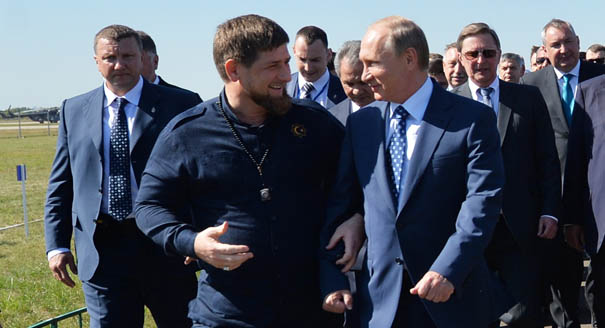Early in the New Year, when Russians were still deep in holiday season and there was little news to be had, pro-Moscow Chechen leader Ramzan Kadyrov suddenly went on a rampage. At a meeting with local journalists, Kadyrov fulminated that members of Russia’s opposition were “enemies of the people” and “traitors” who should be put on trial.
Kadyrov is well known for making wild threats and declamations, but this time there was no obvious motive for his outburst: no new exposes of corruption, no opposition meetings, no press conferences by ousted oligarchs. Russia’s Commissioner for Human Rights Ella Pamfilova described Kadyrov’s words as “harmful.” But he did not stop there.
Kadyrov’s attacks failed to elicit the angry response he evidently craved from the anti-Kremlin opposition. But when a legislator from the Siberian city of Krasnoyarsk, Konstantin Senchenko, called Kadyrov “a disgrace to Russia,” that was a cue to other Chechen politicians to escalate the campaign. They countered with denunciations of “accomplices of international terrorists” and proclamations that Ramzan Kadyrov is “the symbol of Russia.”
Even so, these prominent Chechens, the speaker of the Chechen parliament Magomed Daudov and State Duma deputy Adam Delimkhanov, still seemed to be talking to themselves and not getting the debate they wanted with leading anti-Kremlin critics such as anti-corruption activist Alexey Navalny or Yeltsin-era oligarch Mikhail Khodorkovsky.
Ultimately, however, the insistence paid off. The Presidential Council for Human Rights decided to analyze whether Kadyrov’s words could be qualified as proof of extremism. Then, Kadyrov repeated everything he had already said to the pro-Kremlin Izvestia newspaper—and threw in some additional insults for good measure.
This time, Kadyrov called members of the opposition “vile liberals” with “the stench of cowardly dogs” who should be placed in psychiatric hospitals. Finally, he got a response as Khodorkovsky revived his favorite talking points about an “inevitable revolution” in Russia. Kadyrov then called out a huge rally in Grozny to support him, reported to number as many as 700,000 people. Navalny, for his part, could not leave that without a response.
This whole sequence demonstrates a determined and quite clever attempt by Kadyrov’s team to engineer a public row with Russia’s extra-parliamentary opposition. They deliberately touched on pressure points bound to upset more liberal-minded Russians and to appeal to other conservative parts of society: rhetoric from the Stalin era about “enemies of the people,” “traitors,” and “puppets of Western intelligence services,” and even provocative references to psychiatric hospitals, where the government sent dissidents in the Brezhnev era in order to try to break them down.
Why this loud and radical campaign of insults? The opposition and Russia’s human rights community do speak out strongly against Kadyrov, but they pose him no threat. The Chechen leader is ultimately a pragmatist who has no reason to challenge them so directly.
A common explanation is that this was orchestrated from the top—that in a time of economic trouble—and with parliamentary elections just around the corner—the Kremlin is casting Kadyrov as the “bad cop” in contrast to Putin, who is the “good cop” and to whom there is therefore no alternative in Russia.
The Kremlin is indeed forgiving of Kadyrov’s excesses. Presidential press secretary Dmitry Peskov spun Kadyrov’s words in a tolerant way, saying that the Chechen leader’s invective was directed only at those in the opposition who were acting outside the law.
And yet the Kremlin does not actually want stories like these to develop. They draw too much attention to the opposition and alarm Westerners, just as relations with the West may be about to improve.
Most likely, the initiative came from Kadyrov and the intended audience is in fact the Kremlin itself. His messages follow a set pattern. To the opposition, Kadyrov and his supporters say, “you want to destroy Russia at the behest of Western intelligence services...” Then, they turn around and tell the Kremlin: “…but we are patriots and the pride of our country.” All of this builds up the image of Kadyrov’s Chechnya as an indestructible pillar for the regime.
The second part of the message to the Kremlin also betrays the Chechen leader’s vulnerability: it is an appeal for funding. Every time they talk back to the opposition, Kadyrov and his retinue remind the Kremlin about Chechnya’s “special status” and how it suffered in two bloody wars over the last two decades. “My republic was bloodied by war. The Chechen people know how many lives the peace that now reigns in the republic cost,” Kadyrov asserted in Izvestia. He responded to Khodorkovsky on Instagram with two photographs of Chechen children playing in front of ruins.
Russia’s federal budget is being slashed and this is inevitably leading to a review of the massive subsidies that go to regions like Chechnya that are heavily funded from the center.
Kadyrov needs to remind Moscow that Chechnya is a special region deserving of special subsidies. But he cannot appeal to the Kremlin directly, which is why he is using the opposition as his go-between. All his references to war and the difficult peace Chechnya has achieved serve the same purpose.
Kadyrov’s Chechnya will most likely once again secure these pledges of support from Moscow. But the passionate excess with which he provoked the opposition in order to get his conversation with the Kremlin is also a sign of lack of confidence. Nowadays, Kadyrov has to resort to extreme tactics to remind Russia of the importance of Chechnya’s special status. The opposition sees Kadyrov’s actions as a show of strength, but in reality they are the first signs of weakness.



